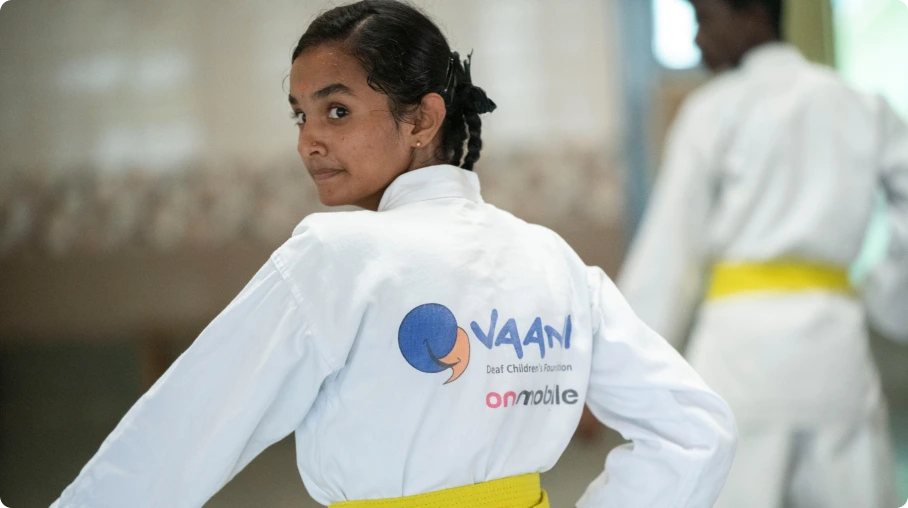Why VAANI?
Does one ever really stop to think about how much our lives depend on oral communication? We take it totally for granted as it happens naturally and automatically the moment we are born. How hard would our lives be if we couldn’t communicate clearly with others? How would it impact our work and personal relationships?
Communication is a basic and core human function, and our survival, as a human being, as an individual person depends on it. If you are born deaf, then this very crucial factor for survival is denied to you.
VAANI, Deaf Children’s Foundation was born, an organisation with a mission and vision to ensure that communication was established between children and their parents and families as the starting point of all learning.
At VAANI We talk about emotional and social needs, of both families and children. We address the trauma that a parent goes through when they realize their child is deaf. We have mothers telling us that for the first time they were in a place where they could talk about their own deep feelings of guilt and shame, of emotional pain, and who realised and appreciated it when their anguish was understood.
Many years ago, I was visiting an NGO in a congested slum in Delhi, to see how their programme built to integrate deaf children into neighbourhood schools was working. They ran a remedial class to support children. I met two mothers there who asked me if I could visit their homes to meet their deaf daughters who had both stopped going to school or coming to the remedial centre. They lived close to each other, so I could meet them both easily, they said.
On getting to their home I was shocked to see that both the girls were obviously heavily pregnant. They were around 11 or 12 years old, nobody was sure. On listening to the two mothers I was distressed and disturbed. I realised the enormity of the problem of their children being deaf and having no way of communicating what had happened to them. The mothers only realised that there was something wrong when they saw that the girls were gaining weight and their stomachs were expanding. They took the children to the local hospital and found out the girls were both pregnant.
They were both crying when they told me how shocked they were, and how they had not been able to get any information from their daughters, who didn’t seem to know what had happened to them, or when or where. The horror for me was that not only had the two children been raped, but that they had no idea or comprehension of what had happened to them. What could be worse – the fact that their bodies had been violated, or the tragedy that they had no way of communicating their situation to their mothers.
Following this, we carried out a series of workshops across the country- workshops attended by parents- to try and get an idea of what the greatest needs and concerns were when thinking about their deaf children. Everywhere the need was the same- why can’t our children understand what we want to tell them? Why can’t we understand them?”
I remember one parent saying “Why does my child not treat me as her mother? She goes to anyone who calls her. I am not special to her.” “How will she know you are her mother?” I remember asking. “You are a familiar person, someone who looks after her and cares for her, but that special bond you talk about can only happen when the child ‘knows and understands’ the concept of ‘mother”.
She sat in front of me, weeping when she began to realise the enormity of what I had said.
During the course of an internet search, I found only one piece of research which focused on sexual abuse of deaf children. The author concluded that “deaf children are at greater risk of sexual abuse than hearing children. Special schools for the deaf represent an extra risk of abuse, regardless of whether the deaf pupils live at home or in boarding schools.”
{Ref: Child Abuse and Neglect by Maret Hove Keam (Volume 28 issue 3rd March 2004}
Expanding the scope of our belief in communication, we at VAANI are launching a campaign to highlight sexual abuse of deaf children. Abuse of children at any age is horrific and barbaric. It becomes doubly so for a deaf child, who has no means to comprehend or communicate a horrific experience. In a country like India where there is little or no information available, where there are so many taboos about what we speak about, especially with respect to issues like abuse, we cannot run away and hide from the fact that an enormous problem of this nature exists.
___________
About the Author:
Brinda Crishna, Founder VAANI Deaf Children’s Foundation has worked in the field helping to build bonds between parents and their deaf children for 35 years. She is passionate about the rights of people with speech and hearing impairment. For more information connect with her @ vaani@vaani.in
This DEAF AWARENESS WEEK, VAANI is launching an online sensitization campaign to increase public awareness on this topic of ‘Child Sexual Abuse Dangers To Hearing Impaired Children’, from. September 23rd, 2020.
If you are a parent, child, non-profit organization working in the field, corporate organization or community worker and would like to get involved, please write to VAANI @ <vaani@vaani.in>


